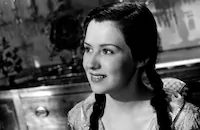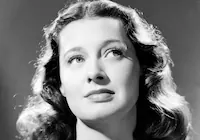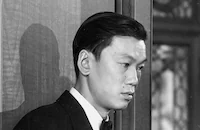China Sky

Brief Synopsis
Cast & Crew
Ray Enright
Randolph Scott
Ruth Warrick
Ellen Drew
Anthony Quinn
Carol Thurston
Film Details
Technical Specs

Synopsis
After eight long years of Japanese aggression, the people of China are still fighting. One of the Japanese targets is the mountain village of Wan Li, which serves as a command base and supply center for the Chinese rebel leader, Chen Ta, and his guerrilla army. At the House of Mercy American Hospital in the village, Dr. Sara Durand receives a cablegram from Dr. Gray Thompson, the hospital's chief of staff, who has gone to New York to secure equipment and supplies. Sara is heartened to learn that Gray is soon to return but saddened by the news that he is bringing his bride with him. Soon after, Chen Ta brings Colonel Yasuda, a wounded Japanese officer, to the hospital for treatment. While there, Chen Ta becomes attracted to nurse Siu Mei, who cautions him that she is betrothed to Dr. Kim. After Chen Ta departs, leaving Yasuda behind in the hospital's charge, Gray and his mink-coated wife Louise, arrive. When Japanese bombers strike, Gray places Kim, a disdainful man who despises all foreigners, in charge of Yasuda and, after escorting Louise to the bomb shelter, returns to the hospital to help Sara with the casualties. Terrified by the bombs, Louise cringes in fear, while Yasuda plays on Kim's dislike of Americans to recruit him to the Japanese cause. After the attack ends, Louise returns home and Sara comes to welcome her. Louise, worried by Sara's beauty, accuses her of being in love with her husband and informs her that she plans to return to New York with him as soon as possible. When Gray enters the room and interrupts Louise's tirade, however, she feigns friendship for Sara. The air raids continue, and as Louise cowers in the shelter, Kim reassures her that the structure is secure because it houses ammunition for the guerrillas. Kim's words are overheard by Yasuda. Later that night, Louise awakens to an empty bed and hurries to the hospital, where she finds Gray and Sara and accuses them of having an affair. After she storms out of the building, Yasuda, who is aware of Kim's rivalry with Chen Ta, asks the doctor to keep him at the hospital rather than releasing him to the guerrilla leader. When Chen Ta presents Siu Mei with a bouquet of flowers, Kim decides to help Yasuda and administers medication that will make him appear ill and therefore unable to be moved. Asked by Chen Ta to treat his wounded men in the hills, Gray takes Sara and Siu Mei with him, leaving Kim in charge of the hospital. After they leave, Yasuda, who has deduced that, although Kim claims to be Korean, he is really half-Japanese, threatens to expose his ancestry unless the doctor cooperates with him. Yasuda instructs Kim to send a message in Louise's name, asking that a plane be sent to the city so that he can escape. Meanwhile, at the rebels' stronghold, Chen Ta proposes to Siu Mei, and when she responds that she is already engaged to Kim, he replies that she will never find happiness if she is unhappy in love. As Chen Ta speaks his words of wisdom to Siu Mei, Sara and Gray finally acknowledge their love for each other. Back in the village, Kim commiserates with Louise and offers to arrange for a plane to fly her home. Louise is reluctant to accept his offer until Sara returns to the hospital and chastises her for making Gray unhappy. Vowing to return home with her husband, Louise agrees to send Kim's coded request for a plane, and Little Goat, the Thompsons' servant, sees Kim hand her a slip of paper. Soon after, the bombing of the village stops. On Christmas Eve, Louise accuses Gray of showing more concern for his work than her happiness, and he reluctantly agrees to take her home. Little Goat overhears his promise and the next day at the hospital, he tells Gray and Sara about the message. Realizing that the delivery of Louise's message coincided with the cessation of the bombing, Gray goes to Yasuda's room to confront Kim. At that moment, Japanese paratroopers drop from the sky, and Kim realizes that he has been double-crossed and that Yasuda's message was not a request for a plane, but a secret code informing the Japanese about the location of the ammunition. Yasuda then shoots at the doctors and escapes, fatally wounding Kim but only grazing Gray. In the hills, Chen Ta and his men see the paratroopers and race toward the village while Thompson leads the villagers in defense of the ammunition supply. Witnessing the death and destruction that she has wrought, Louise runs out into the line of fire and is killed. After capturing Yasuda and securing the ammunition, Chen Ta promises to return for Siu Mei when peace is restored. As the air raids begin again, Sara and Gray join hands to face the bombs together.

Director
Ray Enright
Cast

Randolph Scott

Ruth Warrick

Ellen Drew

Anthony Quinn
Carol Thurston

Richard Loo
"ducky" Louie
Philip Ahn

Benson Fong
H. T. Tsiang
Chin Kuang Chow
James Leong
Jimmy Lono
Gerald Lee
George Chung
Owen Seng
Bob Chinn
Lane Tom Jr.
Harold Fong
Jung Lim
Audrey Chow
Kermit Maynard
Weaver Levy
Charles Lung
Albert Law
Crew
C. Bakaleinikoff
Ralph Berger
Marvin Coil
Albert S. D'agostino
William Dorfman
Al Fields
Maurice Geraghty
Jack J. Gross
Leigh Harline
Joseph Hoffman
Wei Fan Hsueh
Bessie Loo
Gene Milford
Nicholas Musuraca
Francis M. Sarver
Darrell Silvera
Edward Stevenson
James G. Stewart
Vernon L. Walker
Brenda Weisberg

Photo Collections
Videos
Movie Clip
Trailer
Film Details
Technical Specs

Articles
China Sky
China Sky was not one of Buck's favorite projects. She had dashed it off quickly as a magazine story before expanding it for publication as a novel. But it was the third of her stories to reach the screen. Where her epic vision had been translated by MGM in The Good Earth (1937) and Dragon Seed (1944), this time RKO, working with decidedly lower budgets, focused primarily on a love triangle involving Dr. Thompson (Randolph Scott), Dr. Durand (Ms. Warrick) and the society woman (Ellen Drew) Thompson impulsively marries on a fundraising tour. There was talk of the war, of course, and the presence of a Japanese colonel (Richard Loo) taken prisoner. But the studio cut most of Buck's action scenes until the final confrontation between Chinese guerillas under Quinn's leadership and the Japanese Army. Nonetheless, the romance and topical subject were enough to guarantee solid box-office returns.
The film was a typical international mishmash of the studio era, with Mexican-born Quinn hardly the only actor playing a nationality other than his own. Like him, Montana-born Carol Thurston, who played a Japanese-born doctor's unfaithful Chinese wife, made a career out of playing other races. She had even made her screen debut as a Polynesian beauty in Cecil B. DeMille's The Story of Dr. Wassell (1944). At least Loo, who was born in Hawaii, and Philip Ahn, a Korean-American cast as the treacherous medico, were Asian. They would spend most of the war years cast as villainous Japanese, often in films now viewed with some embarrassment. Child actor "Ducky" Louie, in his screen debut, was one of the few Chinese actors to play Chinese in the film. He would enjoy a brief vogue in war films like China's Little Devils (1945) and Back to Bataan (1945) before landing his best role, as Quinn's adopted Native American son in the classic B-film Black Gold (1947).
In many ways, however, the wartime setting was just so much topical window dressing for a film primarily focused on the romantic rivalry between Warrick and Ellen Drew. For Drew, the role of Scott's shallow, conniving wife was a marked change of pace from her usual ingénue casting in such films as If I Were King (1938) and Preston Sturges' Christmas in July (1941). Warrick scored the real triumph in the film, however. For one thing, she was tremendously flattered to be cast in a starring role originally scripted for Claudette Colbert. But she also got the best notices of any of the cast, with many critics hoping the film would point to better things for the actress who had gotten her start as Orson Welles' first wife in Citizen Kane (1941).
But better film roles were hard to come by and Warrick found her greatest success as a television soap star, particularly after she created the role of Phoebe Tyler on All My Children. At the time, however, her main compensation for appearing in China Sky was an unexpected and, by her own description, revelatory affair with Quinn. While her character was sharing furtive romantic glances with Scott (a happily married actor who hated playing love scenes), Warrick found herself drawn to the film's second male lead. At the time, she was caught in an unhappy marriage with an alcoholic actor who once strolled down their street stark naked.
Sensing her unhappiness, Quinn -- who once bragged to her "I want to impregnate every woman in the world" (from Ruth Warrick's autobiography, Confessions of Phoebe Tyler) -- offered to help with a little no-strings romance. At the start of the affair he even warned her, "I trust you are not expecting some immortal words from me at this moment." The romance lasted until the film was complete, during which time he taught her the tango and a great deal about love. As she would say in her memoirs, "Zorba the Greek taught me to dance on the seashore of life."
Producer: Maurice Geraghty, Jack J. Gross
Director: Ray Enright
Screenplay: Brenda Weisberg, Joseph Hoffman
Based on the novel by Pearl S. Buck
Cinematography: Nicholas Musuraca
Art Direction: Albert S. D'Agostino, Ralph Berger
Music: Leigh Harline
Cast: Randolph Scott (Thompson), Ruth Warrick (Sara), Ellen Drew (Louise), Anthony Quinn (Chen To), Richard Loo (Col. Yasuada), Ducky Louie ("Little Goat"), Philip Ahn (Dr. Kim), Benson Fong (Chung).
BW-78m.
by Frank Miller

China Sky
Ruth Warrick (1915-2005) - Ruth Warrick, (1915-2005)
She was born on June 29, 1915 in St. Joseph, Missouri. After attaining a degree in theatre from the University of Kansas City, she left for New York, where in 1938, she joined the Mercury Theater troupe, headed by a young artist on the rise by the name of Orson Welles. When Welles prepared to film Citizen Kane (1941) he took several players from his Mercury Theater (Joseph Cotten, Everett Sloan, Agnes Moorehead) and of course, Ruth Warrick. She made her film debut in Welles' cinematic epic as Emily Norton Kane. Indeed, to many film buffs, Warrick's icy charms are indispensable to the celebrated montage sequence opposite Welles at the breakfast table; particularly when he broaches the subject of her husband's infidelity:
Emily Kane: Charles, people will think...
Charles Kane: What I tell them to think!
Warrick received fine reviews for her performance, and she had good roles in her next two films The Corsican Brothers (1941), with Douglas Fairbanks Jr., and Journey Into Fear (1942), opposite Joseph Cotton. Sadly, Hollywood, not knowing what to do with a well-trained, mature actress like Warrick, began to cast her into routine, forgettable fare: Mr. Winkle Goes to War (1944), China Sky (1945), and Swell Guy (1946). Disney's Song of the South (1947), was a box-office hit, and was her best film in a while, but overall, the material she received over the next few years, simply wasn't worthy of her talents.
Things turned around for her in the mid-50s, when Warrick discovered the medium of television. She had regular roles on The Guiding Light (1953-54), As the World Turns (1956-60), Father of the Bride (1960-61), and was unforgettable as the sinister housekeeper, Hannah Cord, in Peyton Place (1965-67). Yet it was her 35-year run in the role of Phoebe Wallingford in All My Children (1970-2005), that Warrick achieved her greatest triumph. As the rich, intrusive matriarch of the fictitious, affluent town known as Pine Valley, Warrick found a role that could be at once gloriously hammy and quietly conniving - qualities that highlighted her renown versatility as an actress. To honor her contribution to television, Warrick received a lifetime achievement award from the Daytime Emmys last December. She is survived by three children, a grandson, and six great-grandchildren.
by Michael T. Toole
Ruth Warrick (1915-2005) - Ruth Warrick, (1915-2005)
Ellen Drew, 1914-2003
She was born Esther Loretta "Terry" Ray on November 23, 1914, in Kansas City, Missouri. The daughter of a barber, her family moved to Chicago when she was still an infant and she lived a very quiet childhood far removed from the glamour of Hollywood. She was encouraged by some friends to enter a beauty contest when she was just 17. After winning, she tried her luck in Hollywood, but found that they were no immediate offers for her particular talents.
She eventually took a waitressing job at C.C. Brown's, a famed Hollywood Boulevard soda fountain, and had virtually abandoned her dreams as a starlet when William Demarest, a popular actor's agent and well-known character actor, spotted her. Demarest arranged a screen test for her at Paramount, and she was promptly placed under contract for $50 a week.
For the first few years, (1936-38), Drew got only bit parts, and was often uncredited. When she finally got prominent billing in the Bing Crosby musical Sing You Sinners (1938), she decided to change her name, from Terry Ray to Ellen Drew. She earned her first major role in Frank Lloyd's If I Were King (1938) opposite Ronald Colman, yet for the most part of her career, rarely rose above "B" material and second leads. Still, she had some fine exceptions: Preston Sturges' enchanting comedy Christmas in July (1940), with Dick Powell; Tay Garnett's lighthearted war romp My Favorite Spy (1942) co-starring Kay Kyser; Julien Duvivier's taut The Imposter (1944), holding her own with a brooding Jean Gabin; and Mark Robson's chilling low-budget chiller Isle of the Dead (1945) opposite Boris Karloff. Drew made some notable television appearances in the late '50s including Perry Mason and The Barbara Stanwyck Show, before retiring from the entertainment industry. She is survived by her son David; five grandchildren; and five great-grandchildren.
by Michael T. Toole
Ellen Drew, 1914-2003
Quotes
Trivia
Notes
The opening credits read "RKO presents Pearl Buck's China Sky." News items in Hollywood Reporter provide the following information about the film's long production history: RKO bought the rights to Buck's story in September 1941. By February 1942, Islin Auster was signed to produce the picture and in April 1942, Robert Stevenson was slated to direct it. By May 1943, Emmet Lavery was scheduled to write the screen adaptation as well as produce the film. Luise Ranier, Margo, Maureen O'Hara and Kim Hunter were all considered for female leads in the picture and Paul Henreid was considered for the male lead. At one point, David Hempstead was to produce, with Claudette Colbert playing the lead. Materials contained in the RKO Archives Script Files at the UCLA Art Library-Special Collections add that Roy Chanslor, Ketti Frings, S. K. Lauren, Robert Stevenson and Crane Wilbur all worked on versions of the screenplay, but the extent of their contribution to the released film has not been determined.
In a New York Times article, producer Maurice Geraghty stated that one reason for the film's troubled production history was the studio's opposition to the original story line in which a Chinese doctor collaborates with the Japanese enemy. In Buck's story and in the early versions of the screenplay, an embittered, anti-American Chinese doctor named Chung agrees to help the Japanese officer for money. By mid-March of 1944, five months before the start of production, the doctor's nationality had been changed to Japanese-Korean and his name changed to Kim. According to a Hollywood Reporter news item, Bessie Loo, a Chinese technical advisor and interpreter, was hired as assistant director to work with the Chinese extras and bit players. Anthony Quinn was borrowed from Twentieth Century-Fox to appear in the picture. The Film Daily review incorrectly credits Roy Webb with music.

Miscellaneous Notes
Released in United States 1945
Released in United States on Video June 27, 1990
Released in United States 1945
Released in United States on Video June 27, 1990















